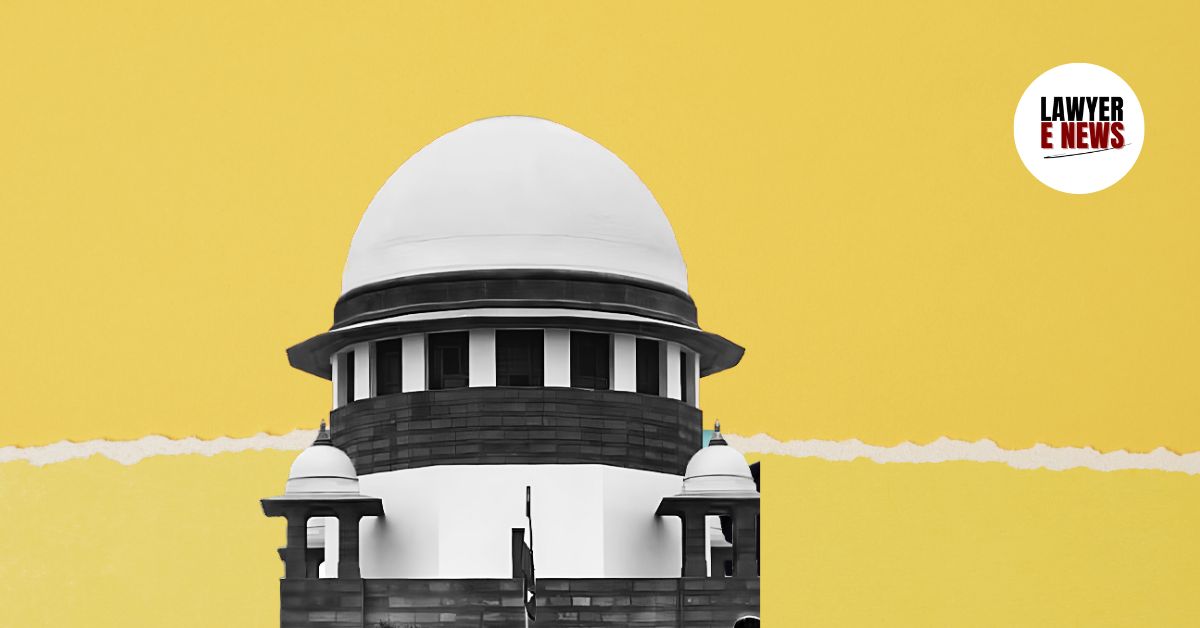-
by Admin
16 February 2026 1:47 PM



“Statute Meant for Organised Crime Cannot Be Weaponised for Political Vendetta” — In a landmark ruling Supreme Court of India, comprising Justice Vikram Nath and Justice Sandeep Mehta, emphatically quashed an FIR registered under the Uttar Pradesh Gangsters and Anti-Social Activities (Prevention) Act, 1986, against two appellants, holding that the invocation of the stringent Act was “arbitrary, unwarranted, and a colourable exercise of power.”
The Court ruled that the Gangsters Act cannot be invoked merely on the basis of an isolated incident, particularly when no subsequent act, continuing criminal activity, or evidence of organised crime exists. Supreme Court observed:
“The invocation of the Gangsters Act in the absence of any subsequent criminal conduct or continuity of offence is arbitrary, violative of personal liberty under Article 21 of the Constitution, and an abuse of process of law.”
“No Evidence of Organised Crime — Protest Over Religious Post Cannot Be Branded as ‘Gang Activity’” — Supreme Court
The incident stemmed from a communal flare-up on 10 October 2022, following an inflammatory social media post that hurt religious sentiments. Multiple FIRs were registered under the IPC for rioting and related offences. Months later, on 30 April 2023, an FIR under Section 3(1) of the UP Gangsters Act was registered against the appellants, linking them to an alleged “gang.”
The High Court had refused to quash the Gangsters Act FIR, prompting the appeal. The Supreme Court overturned that decision, holding that:
“The statutory thresholds under Sections 2(b) and 2(c) of the UP Gangsters Act have not been met. The FIR merely refers to one isolated incident already the subject matter of earlier FIRs with no subsequent acts demonstrating continuity of criminal behaviour.”
“Being Part of a Spontaneous Protest Cannot Constitute Being a ‘Gang Member’”
The Court held: “A group of persons reacting to an inflammatory social media post cannot, ipso facto, be categorised as a ‘gang’ unless there is clear evidence of structured, hierarchical, and continuing organised criminal activity.”
“Temporal Gap and Absence of Fresh Offence Undermines Gang Chart”
“No new act or omission occurred between 11th October 2022 (registration of earlier FIR) and 29th April 2023 (preparation of gang chart). The FIR under the Gangsters Act was nothing but a post-facto construction devoid of legal justification.”
“Gangsters Act Meant for Habitual Offenders, Not Political Opponents”
Referring to the timing of the FIR, which was registered 13 days after the appellant’s daughter-in-law filed her nomination for Nagar Panchayat elections, the Court observed:
“The sequence of events raises serious questions about the bona fides of the prosecution. The invocation of the Gangsters Act bears the unmistakable hallmark of being weaponised for political vendetta.”
“Fundamental Rights Under Article 21 Breached”
The Court declared:
“The invocation of the Gangsters Act, without credible evidence of organised crime, constitutes a gross violation of personal liberty under Article 21 of the Constitution. Extraordinary laws cannot be deployed arbitrarily.”
Reaffirmation of Bhajan Lal Doctrine
The Court relied heavily on the celebrated judgment in State of Haryana v. Bhajan Lal (1992), reiterating:
“Where a criminal proceeding is manifestly attended with mala fide intent, or instituted with an ulterior motive for wreaking vengeance, the Court must step in to prevent abuse of the legal process.”
“Law Must Be Applied As Intended — Not As A Tool For Harassment” — Supreme Court’s Strong Warning
Citing the judgment in Shraddha Gupta v. State of UP (2022), the Court acknowledged that even a single offence could trigger the Gangsters Act “provided the act demonstrates organised crime, continuity, or repeated unlawful conduct.”
But in this case, the Court held:
“A spontaneous, one-time protest triggered by religious provocation, however serious, cannot be elevated to the status of gang activity absent further evidence of sustained criminal conduct.”
Appeal Allowed, FIR Quashed
The Supreme Court decisively ruled: “The impugned FIR dated 30 April 2023, registered as Crime Case No. 132 of 2023 under Section 3(1) of the UP Gangsters Act, and all proceedings consequential thereto, stand quashed.”
It clarified that this judgment would not affect the pending proceedings arising from earlier FIRs registered under the IPC, which would continue on their own merits.
The Court allowed the appeal with the following closing remark: “Extraordinary penal provisions cannot become instruments of oppression. The balance between societal interests and individual liberty must never be compromised by colourable exercises of executive power.”
Date of Decision: 14 May 2025
